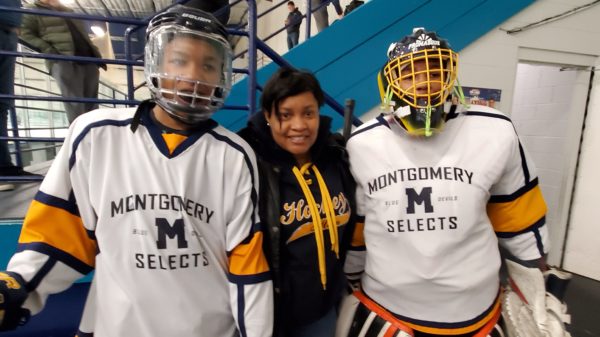Two young, black hockey players are calling out the sport for the racism they have endured from other players, as well as the league’s reluctance to rectify the problem.
Brandon Bernard and his 14-year-old twin brother Landon were initially subjected to racist taunts from the opposing team at a Jan. 9 hockey game. The players of the 14-and-under team Ashburn Xtreme were recorded on video making monkey sounds every time one of the boys skated by. Now, the two Frederick (Maryland) Freeze players are speaking out about their troubling experiences, and the lack of support they feel they have so far received from USA Hockey in handling the matter reports USA Today.

The second account of egregious behavior occurred at a March 6 game in Ashburn, Virginia. An Ashburn Xtreme player “skated up to Brandon and called him a ‘n—–.’” Following the confrontation, Brandon reacted as instructed by his father, and went to tell the referee.
While the Xtreme neglected to act on the report, within a few days, USA Hockey had opened an investigation. It led to the suspension of “Xtreme coach Karl Huber for 10 games, hockey director Troy MacCormick for five games and an unnamed player for three games.”
However, the Bernards did not find out about the ruling until months later, saying that they felt the decisions made by USA Hockey were not severe enough, and should have involved some form of public rebuke for the behavior.
Brandon Bernard said he originally thought the noises were making was simply chanting until he was informed otherwise. “It broke me down,” he told USA Today.
After the initial incident, father Lionel Bernard decided to talk to his sons about the nature of what they experienced, and how to respond to it.
“If this happens again, the first thing you should do is reach out to the referee or coach. Don’t retaliate or get upset,’” Bernard said to them.
“I also told them that this is what you can expect when you’re playing a sport that has a limited number of minorities playing it,” he said. “You’re going to run across this thing. But note that you’re not the first individuals who have faced racism in sports.”
When it came to the second instance of racism, Brandon remembered his father’s advice when confronted with an Xtreme player calling him the N-word.
“The first thing I did when I heard it, (I) was angry, and then I calmed myself down,” he said, “and then I ran over to the ref and was like ‘This, this, and this happened. It was so and so.’”
The game continued on, since the two referees did not hear what was said. Brother Landon, a goaltender, was informed about the slur from a teammate, and he responded by letting the rival team score enough goals for the mercy rule to be invoked to bring the game, as well as the whole ugly encounter, to an end.
“The majority of racist incidents that take place on the ice are not made public or not reported through the proper channels,” said Duante’ Abercrombie, a member of the Washington Capitals’ Black Hockey Committee which involves community leaders tackling the issue of racism and introducing the sport to under-served communities.
“We want to educate to eradicate racism,” Abercrombie said. “Of course, the individual needs to be suspended, because they’ve shown they’re not mature enough to be a part of competition or USA Hockey at the moment. So, suspend their ability to participate, but don’t just cut them off. You have to rehabilitate, so to speak, so that this doesn’t happen again and, honestly, so this individual becomes an advocate for race relations in the future.”
According to USA Hockey, an element of Ashburn’s discipline will include “educational training at the recommendations of the organization’s director of diversity and inclusion, Stephanie Jackson.”
Many individuals and organizations have reached out to support the Bernard brothers as they have come to grips with their circumstances. The Hockey Players of Color Movement, a group made up of players of color who offer guidance to younger players, made a video urging them to not let what happened diminish their love for the sport.
Despite being forced to endure a difficult situation, the brothers know that they are more than racist taunts and that they deserve to be treated as such.
“I want to be defined by my personality, and what I show,” Landon said. “Not just the way I look, or my skin color.”
“I couldn’t say it any better,” Brandon said. “How I treat my teammates. My game, too. I just want to be seen as another player.”
It is this yearning for normalcy that led the Bernards to hold the videos with the monkey noises for months before releasing their story to the public. They feared it would be a distraction and that other players may retaliate.
“When you’re this age, you’re very sensitive. As an adult, if someone does those things to you, you can deal with it, you can process it,” Lionel Bernard said. “But at this age, it gives them the impression they’re not wanted. They’re very peer-sensitive. If their peers start talking to them this way, then that gives them the impression, ‘OK, I don’t want to play this sport anymore.’
“Our goal primarily is to make sure that this doesn’t happen to other kids on the ice which leads them to quit or feel some sort of insecurity about themselves in the long-term,” he added.


